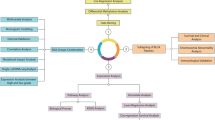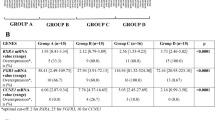Abstract
Urinary bladder cancer is the fifth most common cancer in the Western world. Increasing evidence has shown that DNA methylation in bladder cancer is expansive and is implicated in pathogenesis. Furthermore, distinct methylation patterns have been identified between non-muscle-invasive bladder cancer (NMIBC) and muscle-invasive bladder cancer (MIBC), as well as between FGFR3-mutant and wild-type tumours. Given these distinctions in expression, methylated genes have been proposed as diagnostic and prognostic biomarkers for patients with bladder cancer. Indeed, several studies have revealed that methylated genes—including CDH1, FHIT, LAMC2, RASSF1A, TIMP3, SFRP1, SOX9, PMF1 and RUNX3—are associated with poor survival in patients with MIBC. Further validation of these markers for prognostication as well as surveillance (of patients with NMIBC) is required. Validated markers for progression, diagnosis, survival and BCG response will contribute to clinical decision-making and individualized treatment.
Key Points
-
DNA methylation in bladder tumours might be an early event in cancer pathogenesis
-
Distinct methylation patterns have been identified between non-muscle-invasive bladder cancer (NMIBC) and muscle-invasive bladder cancer (MIBC), as well as between FGFR3-mutant and wild-type tumours
-
The methylation of several genes involved in processes—such as cell cycle arrest, transcription, cell–cell adhesion, apoptosis and cellular differentiation—have been associated with progression in NMIBC
-
Methylation of the CDH1, FHIT, LAMC2, RASSF1A, TIMP3, SFRP1, SOX9, PMF1 and RUNX3 genes is associated with poor survival in patients with MIBC
-
Methylation of SYNPO2 is associated with resistance to BCG treatment in different cohorts of patients with T1G3 bladder cancer
-
DNA methylation might represent a potential target for future therapies in the bladder cancer setting
This is a preview of subscription content, access via your institution
Access options
Subscribe to this journal
Receive 12 print issues and online access
$209.00 per year
only $17.42 per issue
Buy this article
- Purchase on Springer Link
- Instant access to full article PDF
Prices may be subject to local taxes which are calculated during checkout


Similar content being viewed by others
References
Jemal, A. et al. Global cancer statistics. CA Cancer J. Clin. 61, 69–90 (2011).
Babjuk, M. et al. EAU guidelines on non-muscle-invasive urothelial carcinoma of the bladder. Eur. Urol. 54, 303–314 (2008).
Allard, P., Bernard, P., Fradet, Y. & Têtu, B. The early clinical course of primary Ta and T1 bladder cancer: a proposed prognostic index. Br. J. Urol. 81, 692–698 (1998).
Kurth, K. H. et al. Factors affecting recurrence and progression in superficial bladder tumours. Eur. J. Cancer 31A, 1840–1846 (1995).
Habuchi, T. et al. Prognostic markers for bladder cancer: International Consensus Panel on bladder tumor markers. Urology 66 (Suppl. 1), 64–74 (2005).
Sobin, L. H., Gospodarowicz, M. K. & Wittekind, C. (Eds) TNM Classification of Malignant Tumors (UICC International Union Against Cancer) (Wiley-Blackwell, New York, NY, 2009).
Kompier, L. C. et al. The development of multiple bladder tumour recurrences in relation to the FGFR3 mutation status of the primary tumour. J. Pathol. 218, 104–112 (2009).
Stenzl, A. et al. Treatment of muscle-invasive and metastatic bladder cancer: update of the EAU guidelines. Eur. Urol. 59, 1009–1018 (2011).
Sylvester, R. J. et al. Predicting recurrence and progression in individual patients with stage Ta T1 bladder cancer using EORTC risk tables: a combined analysis of 2596 patients from seven EORTC trials. Eur. Urol. 49, 466–467 (2006).
Rouprêt, M. et al. European guidelines for the diagnosis and management of upper urinary tract urothelial cell carcinomas: 2011 update. Eur. Urol. 59, 584–594 (2011).
van Rhijn, B. W. et al. Molecular grading of urothelial cell carcinoma with fibroblast growth factor receptor 3 and MIB-1 is superior to pathologic grade for the prediction of clinical outcome. J. Clin. Oncol. 21, 1912–1921 (2003).
Bakkar, A. A. et al. FGFR3 and TP53 gene mutations define two distinct pathways in urothelial cell carcinoma of the bladder. Cancer Res. 63, 8108–8112 (2003).
van Rhijn, B. W. et al. The fibroblast growth factor receptor 3 (FGFR3) mutation is a strong indicator of superficial bladder cancer with low recurrence rate. Cancer Res. 61, 1265–1268 (2001).
Knowles, M. A. Bladder cancer subtypes defined by genomic alterations. Scand. J. Urol. Nephrol. Suppl. 218, 116–130 (2008).
Esteller, M. Epigenetics in cancer. N. Engl. J. Med. 358, 1148–1159 (2008).
Sanchez-Carbayo, M. Hypermethylation in bladder cancer: biological pathways and translational applications. Tumour Biol. 33, 347–361 (2012).
Laird, P. W. The power and the promise of DNA methylation markers. Nat. Rev. Cancer 3, 253–266 (2003).
Esteller, M. Cancer epigenomics: DNA methylomes and histone-modification maps. Nat. Rev. Genet. 8, 286–298 (2007).
Esteller, M. Epigenetic gene silencing in cancer: the DNA hypermethylome. Hum. Mol. Genet. 16 (Spec. No. 1), R50–R59 (2007).
Jones, P. A. & Baylin, S. B. The epigenomics of cancer. Cell 128, 683–692 (2007).
Nishiyama, N. et al. Genome-wide DNA methylation profiles in urothelial carcinomas and urothelia at the precancerous stage. Cancer Sci. 101, 231–240 (2010).
Wolff, E. M. et al. Unique DNA methylation patterns distinguish noninvasive and invasive urothelial cancers and establish an epigenetic field defect in premalignant tissue. Cancer Res. 70, 8169–8178 (2010).
Kandimalla, R. et al. Genome-wide analysis of CpG island methylation in bladder cancer identified TBX2, TBX3, GATA2, and ZIC4 as pTa-specific prognostic markers. Eur. Urol. 61, 1245–1256 (2012).
Viré, E. et al. The Polycomb group protein EZH2 directly controls DNA methylation. Nature 439, 871–874 (2006).
Chung, W. et al. Detection of bladder cancer using novel DNA methylation biomarkers in urine sediments. Cancer Epidemiol. Biomarkers Prev. 20, 1483–1491 (2011).
Fernandez, A. F. et al. A DNA methylation fingerprint of 1628 human samples. Genome Res. 22, 407–419 (2012).
Reinert, T. et al. Comprehensive genome methylation analysis in bladder cancer: identification and validation of novel methylated genes and application of these as urinary tumor markers. Clin. Cancer Res. 17, 5582–5592 (2011).
van Rhijn, B. W. et al. The FGFR3 mutation is related to favorable pT1 bladder cancer. J. Urol. 187, 310–314 (2012).
Hurst, C. D., Platt, F. M., Taylor, C. F. & Knowles, M. A. Novel tumor subgroups of urothelial carcinoma of the bladder defined by integrated genomic analysis. Clin. Cancer Res. 18, 5865–5877 (2012).
Vallot, C. et al. A novel epigenetic phenotype associated with the most aggressive pathway of bladder tumor progression. J. Natl Cancer Inst. 103, 47–60 (2011).
Costa, V. L. et al. Three epigenetic biomarkers, GDF15, TMEFF2, and VIM, accurately predict bladder cancer from DNA-based analyses of urine samples. Clin. Cancer Res. 16, 5842–5851 (2010).
Lin, H. H. et al. Increase sensitivity in detecting superficial, low grade bladder cancer by combination analysis of hypermethylation of E-cadherin, p16, p14, RASSF1A genes in urine. Urol. Oncol. 28, 597–602 (2010).
Serizawa, R. R. et al. Integrated genetic and epigenetic analysis of bladder cancer reveals an additive diagnostic value of FGFR3 mutations and hypermethylation events. Int. J. Cancer 129, 78–87 (2011).
Marsit, C. J. et al. Carcinogen exposure and gene promoter hypermethylation in bladder cancer. Carcinogenesis 27, 112–116 (2006).
Owen, H. C. et al. Low frequency of epigenetic events in urothelial tumors in young patients. J. Urol. 184, 459–463 (2010).
Sobti, R. C. et al. Hypermethylation-mediated partial transcriptional silencing of DAP-kinase gene in bladder cancer. Biomarkers 15, 167–174 (2010).
Wolff, E. M. et al. RUNX3 methylation reveals that bladder tumors are older in patients with a history of smoking. Cancer Res. 68, 6208–6214 (2008).
Maruyama, R. et al. Aberrant promoter methylation profile of bladder cancer and its relationship to clinicopathological features. Cancer Res. 61, 8659–8663 (2001).
Sathyanarayana, U. G. et al. Molecular detection of noninvasive and invasive bladder tumor tissues and exfoliated cells by aberrant promoter methylation of laminin-5 encoding genes. Cancer Res. 64, 1425–1430 (2004).
Catto, J. W. et al. Promoter hypermethylation is associated with tumor location, stage, and subsequent progression in transitional cell carcinoma. J. Clin. Oncol. 23, 2903–2910 (2005).
Marsit, C. J. et al. Epigenetic inactivation of SFRP genes and TP53 alteration act jointly as markers of invasive bladder cancer. Cancer Res. 65, 7081–7085 (2005).
Kim, W. J. et al. RUNX3 inactivation by point mutations and aberrant DNA methylation in bladder tumors. Cancer Res. 65, 9347–9354 (2005).
Friedrich, M. G. et al. Prognostic relevance of methylation markers in patients with non-muscle invasive bladder carcinoma. Eur. J. Cancer 41, 2769–2778 (2005).
Yates, D. R. et al. Promoter hypermethylation identifies progression risk in bladder cancer. Clin. Cancer Res. 13, 2046–2053 (2007).
Aleman, A. et al. Identification of DNA hypermethylation of SOX9 in association with bladder cancer progression using CpG microarrays. Br. J. Cancer 98, 466–473 (2008).
Hoque, M. O. et al. Quantitation of promoter methylation of multiple genes in urine DNA and bladder cancer detection. J. Natl Cancer Inst. 98, 996–1004 (2006).
Cebrian, V. et al. Discovery of myopodin methylation in bladder cancer. J. Pathol. 216, 111–119 (2008).
Aleman, A. et al. Identification of PMF1 methylation in association with bladder cancer progression. Clin. Cancer Res. 14, 8236–8243 (2008).
Marsit, C. J. et al. Identification of methylated genes associated with aggressive bladder cancer. PLoS ONE 5, e12334 (2010).
Alvarez-Mugica, M. et al. Myopodin methylation is associated with clinical outcome in patients with T1G3 bladder cancer. J. Urol. 184, 1507–1513 (2010).
Yan, C. et al. RUNX3 methylation as a predictor for disease progression in patients with non-muscle-invasive bladder cancer. J. Surg. Oncol. 105, 425–430 (2012).
Kim, J. S. et al. Ras association domain family 1A: a promising prognostic marker in recurrent nonmuscle invasive bladder cancer. Clin. Genitourin. Cancer 10, 114–120 (2012).
Agundez, M. et al. Evaluation of the methylation status of tumour suppressor genes for predicting bacillus Calmette-Guérin response in patients with T1G3 high-risk bladder tumours. Eur. Urol. 60, 131–140 (2011).
Alvarez-Mugica, M. et al. Polyamine-modulated factor-1 methylation predicts Bacillus Calmette-Guérin response in patients with high-grade non-muscle-invasive bladder carcinoma. Eur. Urol. 63, 364–370 (2012).
Zuiverloon, T. C. et al. A methylation assay for the detection of non-muscle-invasive bladder cancer (NMIBC) recurrences in voided urine. BJU Int. 109, 941–948 (2012).
van Rhijn, B. W., van der Poel, H. G. & van der Kwast, T. H. Urine markers for bladder cancer surveillance: a systematic review. Eur. Urol. 47, 736–748 (2005).
Yu, J. et al. A novel set of DNA methylation markers in urine sediments for sensitive/specific detection of bladder cancer. Clin. Cancer Res. 13, 7296–7304 (2007).
Renard, I. et al. Identification and validation of the methylated TWIST1 and NID2 genes through real-time methylation-specific polymerase chain reaction assays for the noninvasive detection of primary bladder cancer in urine samples. Eur. Urol. 58, 96–104 (2010).
Dulaimi, E., Uzzo, R. G., Greenberg, R. E., Al-Saleem, T. & Cairns, P. Detection of bladder cancer in urine by a tumor suppressor gene hypermethylation panel. Clin. Cancer Res. 10, 1887–1893 (2004).
Eissa, S. et al. Urinary retinoic acid receptor-β2 gene promoter methylation and hyaluronidase activity as noninvasive tests for diagnosis of bladder cancer. Clin. Biochem. 45, 402–407 (2012).
Zhao, Y. et al. Methylcap-seq reveals novel DNA methylation markers for the diagnosis and recurrence prediction of bladder cancer in a Chinese population. PLoS ONE 7, e35175 (2012).
Rouprêt, M. et al. A comparison of the performance of microsatellite and methylation urine analysis for predicting the recurrence of urothelial cell carcinoma, and definition of a set of markers by Bayesian network analysis. BJU Int. 101, 1448–1453 (2008).
Vinci, S. et al. Quantitative methylation analysis of BCL2, hTERT, and DAPK promoters in urine sediment for the detection of non-muscle-invasive urothelial carcinoma of the bladder: a prospective, two-center validation study. Urol. Oncol. 29, 150–156 (2011).
Grossman, H. B. et al. A phase III, multicenter comparison of hexaminolevulinate fluorescence cystoscopy and white light cystoscopy for the detection of superficial papillary lesions in patients with bladder cancer. J. Urol. 178, 62–67 (2007).
Jocham, D. et al. Improved detection and treatment of bladder cancer using hexaminolevulinate imaging: a prospective, phase III multicenter study. J. Urol. 174, 862–866 (2005).
Ellinger, J. et al. Hypermethylation of cell-free serum DNA indicates worse outcome in patients with bladder cancer. J. Urol. 179, 346–352 (2008).
Valenzuela, M. T. et al. Assessing the use of p16(INK4a) promoter gene methylation in serum for detection of bladder cancer. Eur. Urol. 42, 622–630 (2002).
Shariat, S. F. et al. Statistical consideration for clinical biomarker research in bladder cancer. Urol. Oncol. 28, 389–400 (2010).
Baker, S. G. et al. Evaluating markers for the early detection of cancer: overview of study designs and methods. Clin. Trials 3, 43–56 (2006).
Bossuyt, P. M. et al. Toward complete and accurate reporting of studies of diagnostic accuracy. The STARD initiative. Am. J. Clin. Pathol. 119, 18–22 (2003).
McShane, L. M. et al. REporting recommendations for tumor MARKer prognostic studies (REMARK). Nat. Clin. Pract. Urol. 2, 416–422 (2005).
Cabello, M. J. et al. Multiplexed methylation profiles of tumor suppressor genes in bladder cancer. J. Mol. Diagn. 13, 29–40 (2011).
Duarte-Pereira, S. et al. Prognostic value of opioid binding protein/cell adhesion molecule-like promoter methylation in bladder carcinoma. Eur. J. Cancer 47, 1106–1114 (2011).
Xuan, Y., Kim, S. & Lin, Z. Protein expression and gene promoter hypermethylation of CD99 in transitional cell carcinoma of urinary bladder. J. Cancer Res. Clin. Oncol. 137, 49–54 (2011).
Lin, Y. L., Liu, X. Q., Li, W. P., Sun, G. & Zhang, C. T. Promoter methylation of H-cadherin is a potential biomarker in patients with bladder transitional cell carcinoma. Int. Urol. Nephrol. 44, 111–117 (2012).
Chan, M. W. et al. Hypermethylation of multiple genes in tumor tissues and voided urine in urinary bladder cancer patients. Clin. Cancer Res. 8, 464–470 (2002).
Friedrich, M. G. et al. Detection of methylated apoptosis-associated genes in urine sediments of bladder cancer patients. Clin. Cancer Res. 10, 7457–7465 (2004).
Urakami, S. et al. Combination analysis of hypermethylated Wnt-antagonist family genes as a novel epigenetic biomarker panel for bladder cancer detection. Clin. Cancer Res. 12, 2109–2116 (2006).
Yates, D. R. et al. Methylational urinalysis: a prospective study of bladder cancer patients and age stratified benign controls. Oncogene 25, 1984–1988 (2006).
Dudziec, E., Goepel, J. R. & Catto, J. W. Global epigenetic profiling in bladder cancer. Epigenomics 3, 35–45 (2011).
Chen, P.-C. et al. Distinct DNA methylation epigenotypes in bladder cancer from different Chinese sub-populations and its implication in cancer detection using voided urine. BMC Med. Genomics 4, 45 (2011).
Acknowledgements
The authors are supported by a research grant from Erasmus MC (Mrace) and a grant from the Dutch Cancer Society (EMCR 2007-3863).
Author information
Authors and Affiliations
Contributions
R. Kandimalla researched the data for the article. All authors discussed the article's content, wrote the manuscript and edited it before submission.
Corresponding author
Ethics declarations
Competing interests
The authors declare no competing financial interests.
Supplementary information
Supplementary Table 1
Overview of all DNA methylation markers in bladder cancer (reported up to April 2012). (DOC 465 kb)
Supplementary Table 2
Urine methylation markers in bladder cancer (DOC 212 kb)
Rights and permissions
About this article
Cite this article
Kandimalla, R., van Tilborg, A. & Zwarthoff, E. DNA methylation-based biomarkers in bladder cancer. Nat Rev Urol 10, 327–335 (2013). https://doi.org/10.1038/nrurol.2013.89
Published:
Issue Date:
DOI: https://doi.org/10.1038/nrurol.2013.89
This article is cited by
-
Clinical performance and utility of a noninvasive urine-based methylation biomarker: TWIST1/Vimentin to detect urothelial carcinoma of the bladder
Scientific Reports (2024)
-
BladMetrix: a novel urine DNA methylation test with high accuracy for detection of bladder cancer in hematuria patients
Clinical Epigenetics (2022)
-
Bladder cancer detection in urine using DNA methylation markers: a technical and prospective preclinical validation
Clinical Epigenetics (2022)
-
Exploring urine sediments as a non-invasive method for DNA methylation detection in bladder cancer
African Journal of Urology (2022)
-
Tackling tumor microenvironment through epigenetic tools to improve cancer immunotherapy
Clinical Epigenetics (2021)



